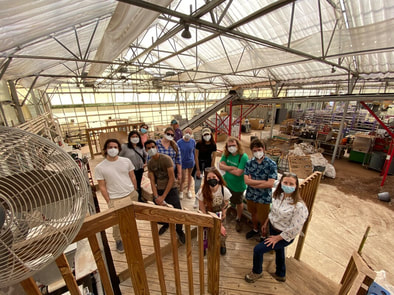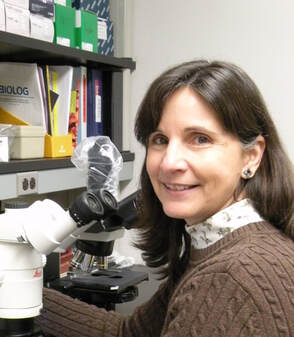|
writen by: Demian A. Nuñez and Darsy Smith
The end of the semester is here! For the last weekly seminar series, the Entomology Department welcomed Dr. Jason Rasgon to speak about his research and experience with new molecular tools for gene editing in arthropods. Dr. Rasgon completed his Ph.D. at the Entomology Department of the University of California, Davis. There he had the opportunity to conduct research on Wolbachia infection dynamics, a naturally occurring bacteria that lives within several insect taxa and is passed from one generation to the next through their eggs. Since early in his career, he has successfully answered research questions in various systems, which has given him the experience to lead projects across a wide range of biology-subdisciplines. Currently, he is a professor of Entomology and Disease Epidemiology at Pennsylvania State University, where he integrates population biology, ecology, molecular tools, and theory to answer both fundamental and applied questions in genetics. The main goal of Dr. Rasgon’s lab is the development of new methods that can be used to introduce transgenes into natural disease vector populations.  Before you bug out for the summer, we invite you to look back at Spring 2022 with us. DYK, the Entomology minor graduated its first students at spring commencement? Or that Dr. O’Brien was awarded the OMSE Excellence in Service Award this spring? Or that, in May, alum William Gimpel talked to the WaPo about developing alpha-gal syndrome after an encounter with a Lonestar tick? These are just a few of the stories mentioned in the Spring 2022 newsletter. Content also includes news on publications, awards, defenses and much more. As weather warms lone star ticks are expanding their territory North. Mike Raupp explains in the New York Times more about the tick, including why its bite can lead to a red meat allergy called alpha-gal syndrome. & The Washington Post interviews alum William Gimpel about his experience after developing the syndrome.
Quote from Raupp in NYT: “What we’re now seeing is a wide-open door for ticks to continue expanding their range further northward” Quote from Gimpel in Post: "I developed hives, fainted, my blood pressure dropped, and I told my wife on the way to the ER that I could not see. That has been my most serious reaction." Read NY Times article here>> Read Washington Post article here>> The emerald ash borer (EAB) is a small and mesmerizing beauty and also one of the most destructive invasive species in the US. Since its introduction to the US in 2002 it has killed millions of ash trees causing serious economic and ecological damage. One approach for long term EAB management has been to introduce parasitic wasps from EAB’s native range to the US for biocontrol. A recent study by UMD and USDA researchers, Stokes Aker, Rafael de Andrade, Jian Duan and Dan Gruner – published this year in the Journal of Economic Entomology – takes a closer look at the performance of these wasps.
Their study suggests that Spathius galinae has a higher recovery and spatial spread compared to Spathius agrili, at least in Maryland. The authors would like to see continued monitoring and evaluation of both species to gain a better understanding of why one parasitoid appears to have gained a better foothold in Maryland than the other. Information like this is important to improve the efficacy of current biocontrol programs against EAB in North America. Before concluding a shout out is needed. Congrats to Stokes Aker this is his 1st first-authored paper, and to Dan Gruner his proud UMD mentor.  Dr. Shrewsbury guest leads BSCI487 field trip to Bell Nursery. Dr. Shrewsbury guest leads BSCI487 field trip to Bell Nursery. This spring Dr. Hamby kicked off a new course BSCI487, “IPM: science-based decision making for sustainable pest management.” The course explores sustainable pest management in agroecosystems using the integrated pest management (IPM) paradigm. The class of 11 students met each Tuesday and Thursday for lecture, discussion, lab and the occasional field trip. Sankara Ganesh, an undergraduate Biological Sciences major specializing in Ecology and Evolution with a minor in Entomology and Sustainability, describes the course as the perfect overlap between his interests in biology and sustainability. The class taught him about the various consequences of pesticide overuse including risks to human health, environmental contamination, non-target effects on beneficial arthropods, and the development of pesticide resistance. Now that Sankara has taken the course he feels even more enthused about IPM, saying “The key to managing pests while minimizing consequences lies within IPM.” Sankara highly recommends the course, saying “It's the kind of course that students from any major can enjoy and succeed in as long as they make an effort to learn and participate. Also, Dr. Hamby is a very patient and understanding professor who treats all of her students with respect and kindness.” So, if you are interested in learning more about pest management, sustainable food production and the health of our planet, consider registering for BSCI487 when it is offered next. The course is acceptable toward Biological Specialization Areas: ECEV and GENB (Ecology, Behavior & Organismal category) and the Entomology minor.  Grace Soltis, first student to join the minor when it launched in 2021. Grace Soltis, first student to join the minor when it launched in 2021. When Terps graduate this semester, some will be stepping off the stage with the Entomology minor on their diploma. The minor program is designed to provide students with a broad understanding of the form and function of insects, their interactions with people and society, and their role as model species for fundamental and applied research. After fulfilling the core course requirements in general and advanced entomology, minors take two to three electives that cover a wide variety of subjects including, advanced biology, pollination biology, plant sciences, and environmental sciences. Grace Soltis, a Biological Sciences: Ecology and Evolution Specialization student (soon to be alum!), was the first student to join the minor when it launched in 2021 and will be one of the first to graduate. She joined Dr. Dan Gruner’s lab in January of 2020. In 2021, Grace was awarded the Ernest N. Cory Undergraduate Scholarship for her extraordinary efforts in Entomology. In May we congratulated her once more, this time for successfully defending her entomology honors thesis, "Periodical cicadas emergence triggers dramatic shift in avian foraging,” a project that measured the impact of Brood X cicadas on the food webs of Maryland forests. It has been wonderful having Grace in the Entomology Minor and Honors Program. We wish her all the best in her next endeavor, a PhD program in Biology: Ecology and Evolution at Florida State University.  Please join us in congratulating Dr. Karen Rane, Director of UMD’s Plant Diagnostic Lab, for being named recipient of the National Plant Diagnostic Network’s (NPDN) Lifetime Achievement Award. Quote from NPDN announcement: “Since the beginning, NPDN has benefited from Rane’s practical experience and advice, whether it was in developing training tools, setting priorities or mentoring new diagnosticians.” Read the networks full press release here: https://www.nifa.usda.gov/about-nifa/blogs/national-plant-diagnostic-network-recognizes-outstanding-service-lifetim  written by: Mintong Nan and Lindsay Barranco Let’s face it. Graduate school can be a wonderful experience, but there are stressors aplenty - from financial worry to time management, coping with expectations of yourself and others, all in a field of scientific research - where the nature of the work involves a high degree of uncertainty and uncharted territory1, 2. These cumulative pressures can all lead to a great deal of stress for the graduate student, especially during the COVID-19 pandemic. Thankfully, skilled and caring professionals like Ms. Simone Warrick-Bell are there if needed. Ms. Warrick-Bell has been a graduate student academic counselor for the University of Maryland (UMD) Graduate School since early 2020, and prior to 2020 she was a care manager with the UMD counseling center. She holds a Master’s in Counseling Psychology and is a licensed Clinical Professional Counselor. Her works include individual consultation sessions and leading graduate student circle sessions, which were created solely to support UMD graduate students. The entomology department was happy to welcome Ms. Warrick-Bell to our Friday seminar series and to hear more about the services she provides through the Graduate School. written by: Ebony Argaez and Minh Le
The natural world is teeming with gorgeous and awe-inspiring biological structures, patterns, and colors that cannot be described via mere words alone. During the digital age, accurate and realistic imagery of these specimens can be obtained through the lens of a camera. However, the camera can only capture what is, not what could have been. Exquisite imagery requires the gentle and imaginative hand of an artist like Taina R. Litwak a scientific illustrator with the US Department of Agriculture’s Systematic Entomology Lab and the Smithsonian Institution’s Museum of Natural History who joins this week’s entomology colloquium at the University of Maryland to talk about entomological art in the digital age. written by: Eric Hartel
Combining different schools of thought or discipline can lead to more meaningful discovery and understanding. The work of Dr. Chris Hamilton addresses this by studying Aphonopelma, a group of tarantulas that are found in the incredible and unique biome of sky islands in the southwestern United States and Mexico. This group of tarantulas are important as a marker for understanding the region, and hold a place of cultural significance in the San Carlos Apache creation story. What is a sky island you ask? They are made of mountain ranges that are surrounded by desert valleys. These mountains create interesting temperature and humidity gradients that play host to various stratified environments. These environments are similar to ocean islands because the deserts take the role of the impassable ocean, isolating organisms to specific islands if they can not cross the desert. The tarantulas in this area have no way to cross the large deserts and are partitioned into their niches across this area. The speciation and diversity of these tarantulas can shed light on the geologic history, evolution, and current state of this understudied diversity hot spot. We are very pleased to announce that the winner of the CMNS Board of Visitors Junior Faculty Award is Entomology's Assistant Professor, Karin Burghardt! Karin’s work focuses on human-mediated impacts on plant and insect community interactions and populations. In addition to carrying out this research Karin is a highly engaged university citizen. She teaches undergraduate level courses, serves on a number of committees and shares her knowledge about sustainable practices with the general public.
Please join us in congratulating Karin on this well deserved recognition. & FYI, Karin will be presenting at Science on Tap Monday, May 2, so swing by her talk if you are able. A great opportunity to congratulate her in person and learn more about her work. Share on facebook https://www.facebook.com/UMDEntomology/posts/4903191633137278 Share on twitter https://twitter.com/UMDEntomology/status/1520070481621172227?s=20&t=I11G1GtSihGzgy_AIKzsiA |
Categories
All
Archives
June 2024
|
Department of Entomology
University of Maryland
4112 Plant Sciences Building
College Park, MD 20742-4454
USA
Telephone: 301.405.3911
Fax: 301.314.9290
University of Maryland
4112 Plant Sciences Building
College Park, MD 20742-4454
USA
Telephone: 301.405.3911
Fax: 301.314.9290

 RSS Feed
RSS Feed




